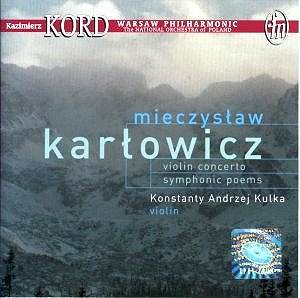The
contrast between the tuneful game-play of the light romantic Violin
Concerto and the earnestness and despair of the two symphonic
poems could hardly be more stark. The poems are torrid - finding
their life-spring in the Tchaikovsky of Francesca da Rimini
and the Sixth Symphony and in the exaltation of high places
that inspired Delius, Novak and Fibich.
Kulka
and Kord have pleasant sport with the Violin Concerto which
cuts a stylish dash but remains light of heart. This is music
that is pleasingly rounded and occupies a folk serenade tradition
with the Glazunov, de Boeck, Ivanovs and Tchaikovsky concertos
stretching back to Bruch. Its themes are memorable superior for
example to anything in the Saint-Saëns concertos if not to
Caprice Andalou, Havanaise and Introduction and
Rondo Capriccioso. Amongst the three versions I have heard
there is little to choose. There is a rare Polish CD version where
the soloist is Wanda Wilkomirska which I have not heard. I do
however have Kulka's earlier 1979 recording where the conductor
was Rowicki. That is on a long gone Olympia CD (OCD304). It still
sounds rather good if thinner than the very rich balance to be
had on this CD Accord. Kulka's reading seems pretty much
unchanged. Thanks to the generosity of one of my net contacts
I have heard a CDR of CDM LDC 278 1088 in which Kaja Danczowska
(who plays the two Szymanowski concertos on CD Accord ACD 026)
plays the work with the Polish Radio Cracow orchestra conducted
by Antoni Wit (another veteran of EMI's Szymanowski centenary
project in 1981-2) and that is certainly impressive. Kulka is
easily recommendable so if you like the Tchaikovsky and the Bruch
then don’t hesitate.
The
theme near the start of Stanisław and Anna Oświeczim
is surely a thinly-veiled recollection of the grandiloquent
melody from the first movement and peroration of the Violin Concerto.
There are quilted heavy textures, damasks from which the French
horns surge and punch outwards and upwards at climactic moments
- Strauss and Bax echoes abound. The updraft of the opening suggests
Elgar’s Froissart and Szymanowski’s Concert Overture.
The piece ends in a whispered rustling bed of strings with the
regretful murmur of woodwind to refer back to the tragedy.
There
are several commercial recordings of Eternal Songs a
triptych of poems in the form of a rhapsodic symphony. Jerzy Salwarowski’s
version is vibrant but unrefined in sound and with very noticeable
hiss. The set is part of a complete 2CD collection of the Karłowicz
tone poems with the Silesian State Philharmonic. It is on the
Dux label which has recently secured a U.S. distributor. Salwarowski
takes things even quicker than Stanislaw Wislocki whose 1965 recording
with the Warsaw National Symphony was last available on a long-gone
Olympia OCD 307. Wislocki makes more of the Song of Love and
Death with its parallels with Tchaikovsky’s Fifth Symphony.
For all of its AAD provenance the hiss levels are well tamed by
comparison with the Dux set. Technically speaking the best sounding
of all is the latest from Chandos issued in 2002 (CHAN 9986) where
the BBC Phil are conducted by Yan Pascal Tortelier. Chandos even
make some sort of clarity out of the brusque attitudinising of
the start of The Song of Eternal Being. Kord makes a fine
interpreter of the whole piece with more restlessness and the
sort of darkness invoked by Rachmaninov in The Isle of the
Dead, by Glazunov in his Salome music and by Tchaikovsky
in Hamlet and parts of Manfred. Kord is certainly
a very strong contender if without the out and out missionary
zeal Rozhdestvensky brought to a rare radio broadcast he made
in 1981 with the Chicago Symphony. Even so listen at 4.40 to those
hallooing French Horns of Kord’s Warsaw Orchestra. Hearing this
reminds me that I first heard Kord through a radio broadcast in
1977 of Szymanowski’s Second Symphony with the Austrian Radio
Symphony Orchestra. The Studio 7 recording by the BBC Phil bests
the CD Accord version in audio terms. You pays your money and
takes your choice. The couplings all differ (Chandos, Olympia
and Dux all match Eternal Songs with Karłowicz’s other
tone poems) and certainly to have the splendours of the Violin
Concerto matched with the high hills romanticism of Eternal
Songs makes for a potent combination.
The
disc is generously packed and interpretative and audio values
are high. Well worth tracking down for acolytes of hothouse late
romanticism.
Rob
Barnett
MusicWeb
is now selling the CDAccord catalogue

![]() for
details
for
details